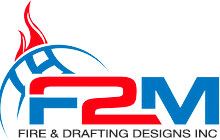Archive for June 2021
How Does a Fire Sprinkler System Work?
How does a fire sprinkler system actually work? Fire Sprinklers are an essential apparatus for protection against fire damage, be it property or people. Fire sprinkler systems are usually present in commercial, industrial, and residential spaces. The probability of a fire starting in such places is always high due to several reasons, such as electrical wiring and heating appliances.
Other major reasons for fires in households are accidents, such as leaving the stove unattended. Overall, a fire sprinkler system ensures safety from fire hazards. By protecting workers from severe injuries, it helps companies avoid lawsuits. Moreover, it protects your family or tenants from injury while preventing damage to their possessions.
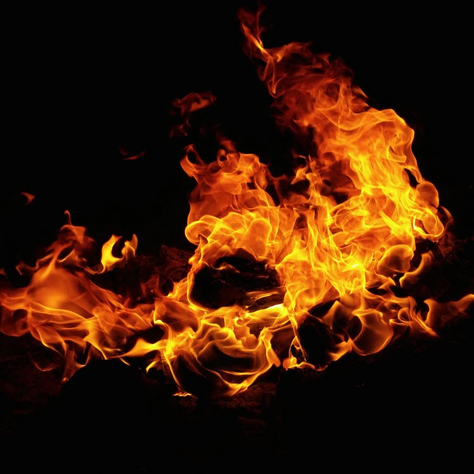
(Source)
Despite various benefits, a few misconceptions reduce people’s trust in sprinkler systems. These minute yet, misleading misconceptions are as below.
Fire System Misconceptions
- Smoking a cigarette will trigger fire sprinklers
- Smoke detectors trigger fire sprinklers
- Immense water damage is the consequence of using a fire sprinkler system
- All the fire sprinkler heads activate when one triggers the alarm
- Automatic shutdown of fire sprinkler system occurs after extinguishing the fire
It’s time to address these misconceptions. Read on to learn how a fire sprinkler system works in real life.
How does a Fire Sprinkler System Work?
Heat-Detection and Activation
Contrary to popular belief, smoke is not what causes a room’s temperature to rise, and trigger the fire sprinkler system. Hence, preparing toast in the kitchen or smoking in the living room won’t trigger the fire sprinkler system.
Sprinkler heads normally contain a glass bulb with a glycerin-based solution. This solution expands and bursts on exposure to certain ranges of temperature. When a fire ignites and is not controlled or extinguished, the fire starts to spread. The blaze heats up the air, and as the hot air rises above, it comes in contact with the ceiling, where it continues to spread.
This contact with heat bursts the glass bulb, triggering the fire sprinkler(s). The head of the fire sprinkler, which detects heat, douses the fire. A pipe, leading to the water source, releases a pressurized discharge as the trigger of the fire system opens the valve attached to the pipes.
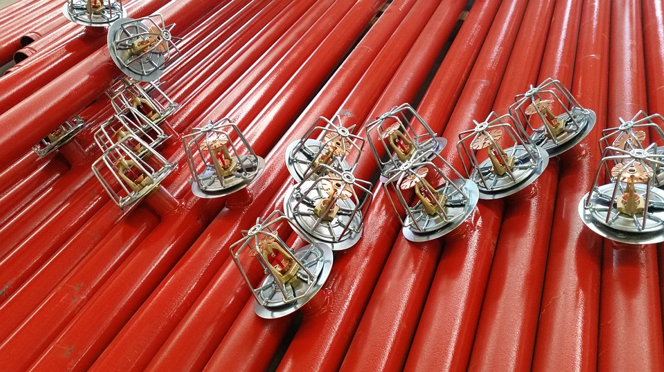
(Source)
Fire sprinkler systems may connect with pipes that already contain water or have a connection to the main water supply. Similarly, an electronic device may control the valve or there may be a manual switch to turn the fire sprinklers on and off.
With pressure in the water flow, water dispersion is wide. Hence, sprinklers utilize a greater range to douse the fire.
After Dousing Fire
You can control fire sprinkler systems via fire alarms, switches, and the valves. Contrary to popular belief, you have to manually shutdown the fire sprinkler system after the fire is completely out. Thus, another misconception cleared. Similarly, these gadgets also allow you to stop fire sprinklers before your property faces excessive water damage.
A generic misconception among people regarding fire sprinkler systems is that all sprinkler heads start discharging water, even if only one head triggers the fire alarm. This is definitely not the case if you have the latest fire sprinkler system. That is, unless you opt for the “deluge” fire sprinkler system, which releases water through all the sprinkler heads when a single fire alarm goes off.
Maintenance, Repair, and Testing of Fire Sprinkler Systems
Regular inspections are a vital part of the fire safety system. Inspections of the gauges, gadgets (manual switches), pipes, bracings, valves, and electronic devices take place on quarterly and even monthly basis.
Repairing any faults or errors in the fire sprinkler system can compensate for any potential losses in the future. Therefore, inspections and maintenance are necessary to employ a fire safety system to its full extent.
How Does a Fire Sprinkler System Work? Conclusion
F2M Fire & Drafting Designs Inc. offers an impressive variety of fire sprinkler system design services. F2M designs gold standard fire sprinkler systems for office buildings, personal residences, rental properties, or any other commercial, residential or industrial building. We work with you every step of the way, customizing the system per your requirements and budget.
Give us a call at (718) 928-3009 to inquire about our services, current projects, and to consult about your fire sprinkler design project. Email us at info@f2mfadds.com.
Fore more information, visit our main website at: https://www.f2mfadds.com/
References & Related Links:
- https://www.explainthatstuff.com/firesprinklers.html
- https://home.howstuffworks.com/home-improvement/household-safety/fire-sprinker-system.htm
- https://www.gausman.com/Our-Company/News/entryid/263/how-do-fire-sprinklers-work-in-commercial-buildings
- https://blog.koorsen.com/how-do-fire-sprinklers-work
- https://www.keystonefire.com/blog/how-it-works-fire-sprinkler-systems/
- https://fireprotectionblog.com/how-do-fire-sprinklers-work/
What are the Differences in Commercial & Residential Fire Sprinkler Systems?
Commercial & Residential fire sprinkler systems have a few key differences which we will discuss in this article. The primary use of fire sprinkler systems is to extinguish and restrict the spread of fires in a commercial, industrial, or residential space. Inexperienced building owners, either commercial or residential, make the mistake of assuming that all fire sprinkler systems are the same. They also presume that the application of every fire sprinkler system is the same for any type of building.
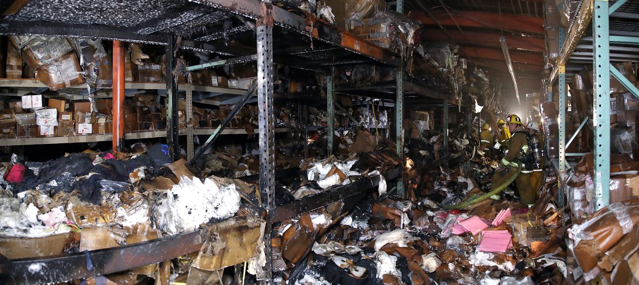
(Source)
This misconception leads building owners to choose the wrong types of fire sprinklers and suppression systems. Often, this leads to major losses and damage. Let’s go over the differences between them, starting with commercial fire sprinkler systems.
Commercial Fire Sprinkler System
In the event that a fire spreads through the property, commercial fire sprinkler systems prevent extensive fire damages in offices and public spaces. These systems restrict the spread of fire and reduce the smoke, allowing workers to exit the space safely until the fire department services arrive. Some of the types of commercial fire systems are below.
4 Types of Commercial Fire Sprinkler System
- Dry Pipe
This type of fire sprinkler and suppression system includes pipes containing pressurized nitrogen or air. When the fire sprinkler head activates, it releases air. This triggers the discharge of water from the sprinkler heads, which suppresses the fire and restricts the spread.
These are costly and need consistent maintenance, but they are suitable for cold climates as well. Because the pipes in this system contain pressurized air, the chances of water freezing are low.
- Wet Pipe
Cheap and low-maintenance wet pipe fire sprinklers systems are traditional. These pipes contain water, and when the alarm rings, they release pressurized water through each sprinkler head independently.
- Pre-Action
When a smoke or heat detector sends the signal, the pre-action valve opens, allowing water to flow into fire sprinkler pipes. Then, each sprinkler head discharges water. This is a good option when it comes to false alarms. They offer protection from unnecessary water damage.
- Deluge
All sprinkler heads are open in this fire sprinkler system. Upon external heat detection, the water flows through all the sprinkler heads. Applications for this type includes commercial places that involve highly combustible and flammable material and practices in daily operations.
Benefits of Fire Sprinkler Systems in Commercial Buildings
Commercial fire sprinkler systems are a requirement in some states. Therefore, it is necessary for building owners to install and maintain fire sprinkler systems in offices and workplaces. They offer numerous benefits to commercial buildings.
- Assets and corporate property safety
- less long-term corporate expenses
- safe and confident work staff and employees
- control on the spread of fires in emergencies
Residential Fire Sprinkler Systems
Residential fire sprinkler systems have the same purpose as the ones in commercial buildings. The fire sprinkler systems may even be the same in some aspects. Nevertheless, there are relative differences in commercial and residential fire sprinkler systems.
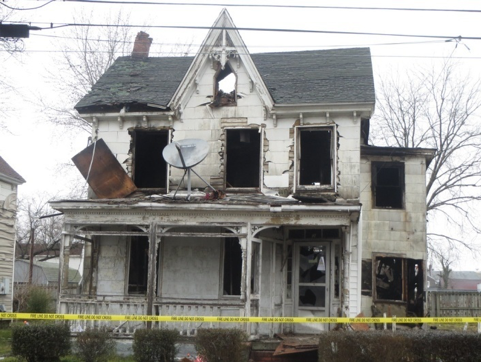
(Source)
Sometimes, homeowners install and maintain fire sprinkler systems to benefits home insurance premiums. This is because the house becomes less susceptible to damage or accidents. Thus, insurance coverage allows low premiums. These are “insurance discounts,” and commercial building owners receive them as well.
Sometimes, fire sprinkler installation takes place during construction. But if a house requires fire sprinkler systems post-construction, the concept of “retrofitting” emerges. Everyone living in the house or apartment feels safe. This also makes you a responsible homeowner or landlord to your tenants or family.
Major Differences in Commercial & Residential Fire Sprinkler Systems
In the US, NFPA Codes and Regulations vary for commercial and residential buildings. Therefore, fire sprinkler systems comply with specific rules and codes in both types of buildings. The design of commercial and residential-level fire safety systems varies as well.
A commercial fire sprinkler system will have the design and installation to prevent fire damage and risks according to space. For example, restaurants, offices, warehouses, shops will have risk assessments for fire emergencies. This usually allows the proper employment of resources to control fire in such commercial spaces.
Nevertheless, residential fire sprinkler systems are similar to each other. Contrary to the large commercial spaces, small households have smaller fire sprinkler systems.
The costs of fire sprinkler systems in commercial and residential spaces also significantly varies.
Differences in Commercial & Residential Fire Sprinkler Systems: Conclusion
When designing a fire sprinkler system for your new project, the differences between residential and commercial fire sprinkler systems will play a major role. F2M Fire & Drafting Designs creates custom fire suppression system designs using state of the art technology and the most modern techniques. All designs are gold standard code compliant, and they licensed across the USA in many states.
Give us a call at (718) 928-3009 to inquire further or email us at info@f2mfadds.com.
Visit our main website for more information: https://www.f2mfadds.com/
References & Related Links:
